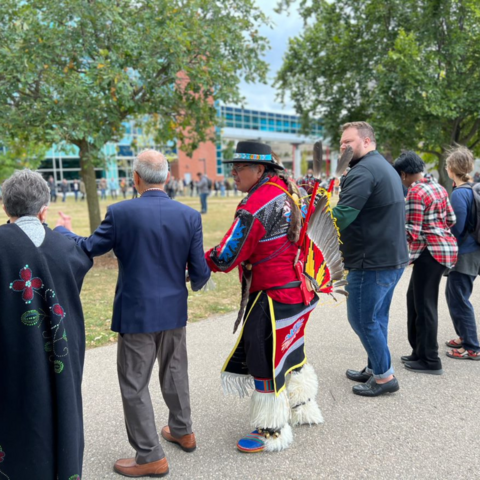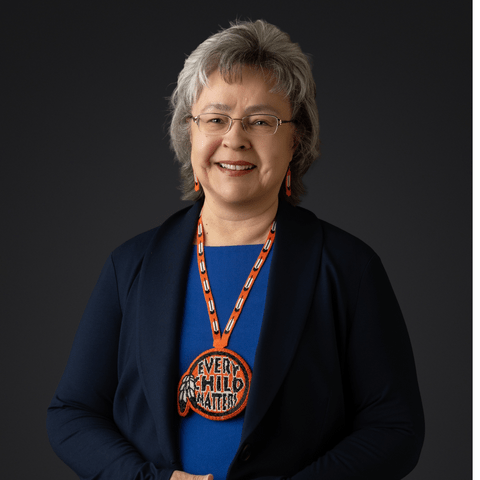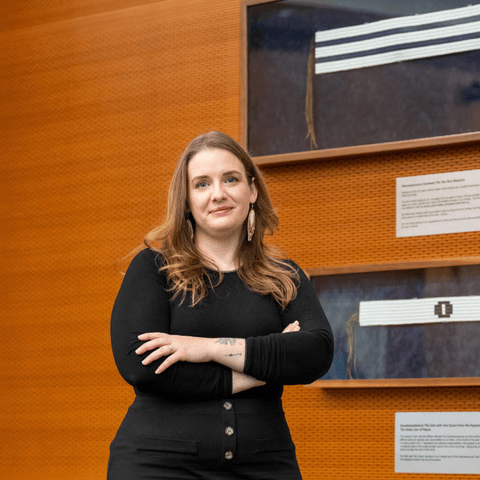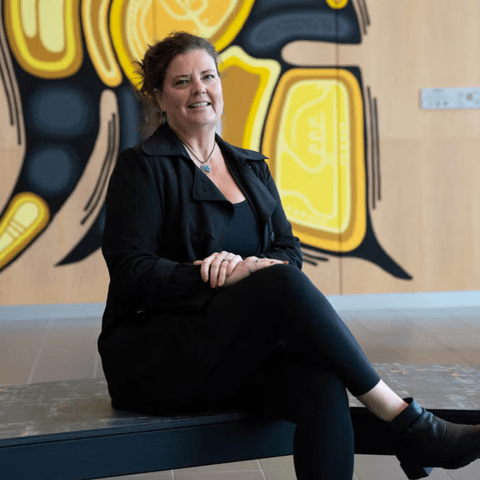Thank you for visiting the Office of Indigenous Relations. We work collaboratively on and off-campus to advance the goals of the Truth and Reconciliation Calls to Action, creating a long-term vision for the University, grounded in decolonization.
"Our goals are intended to advance a strategic focus on the advocacy, commitments and actionable areas that will enable the University of Waterloo to strengthen Indigenous inclusion and leadership."
Explore our work and the ongoing Indigenous relations at the University of Waterloo
Quick links for students
News and upcoming events
Events
Phyllis Webstad in KW
Join us for an inspiring event centered on Indigenous knowledge, storytelling, and reconciliation with Phyllis Webstad, Founder and CEO of the Orange Shirt Society. Phyllis shares her powerful story of attending residential school and how her orange shirt became a national symbol of remembrance, hope, and a commitment to a better future.
Hosted in partnership with Mennonite Central Committee (MCC) and Conrad Grebel University College, this event invites the University of Waterloo community to listen, reflect, and engage in meaningful dialogue on actionable steps toward reconciliation.
Nomad: Correcting the Narrative
Join the Office of Indigenous Relations on Tuesday March 31, 2026, for an inspiring evening of Song and Stories with Canadian award-winning Inuk singer-songwriter, Susan Aglukark.
Susan is a celebrated Canadian artist and advocate who has spent over 25 years using her music to share Indigenous stories, history, and lived experiences. Her powerful narrative will take her audience from her roots in Nunavut to becoming a household name in Canada, weaving together the themes of empowerment, cultural identity, and self-respect.
News
Giving history a voice
New research at the University of Waterloo is centring Haudenosaunee voices in documenting the 1988 repatriation of eleven wampum belts to the Haudenosaunee Confederacy. Led by Tuscarora scholar Savannah Sloat and historian Dr. Talena Atfield, the project gathers first-hand community accounts to highlight wampum as living agreements tied to law, governance, and sovereignty.
Cultural connection key to healthy aging for Indigenous elders
PhD student Dale Bellaire’s research explores how culturally grounded connections can support the well-being of Indigenous Elders living in urban long-term care. Guided by a Medicine Wheel framework, her work emphasizes holistic health and centres Elders as collaborators in shaping meaningful, land-informed spaces and activities. The research contributes to the Truth and Reconciliation Commission’s Calls to Action and aims to strengthen identity, belonging, and cultural resurgence for Indigenous older adults.
Indigenous Connections – Fall 2025 | Volume 17
The Legacy Edition
As we move through the fall season, a season of change and reflection unfolds across our campus. It is a time to pause and honour the stories, guidance, and dedication that shape our community; threads of experience and care that continue to inspire each of us. In this season, we are reminded that the work of connection and growth is ongoing, rooted in the contributions of those who came before and carried forward by those walking alongside us today.
This season, we celebrate the extraordinary contributions of Jean Becker. As Associate Vice-President, Indigenous Relations, she has championed Indigenization on campus, fostered spaces for learning and connection, and supported generations of students in meaningful ways. As she steps into retirement, her influence remains deeply woven into campus life, inspiring us to carry forward her commitment, care, and leadership.
As the leaves turn and the campus hums with the rhythm of learning, gathering, and renewal, we step forward into the season ahead, open to the stories yet to be written, the connections yet to be made, and the legacy yet to unfold.
Indigenous Connections –Summer 2025| Volume 16
The Sacred Bundle Edition
As summer’s light stretches long across the days, we are reminded of the sacred bundle we carry together—a gathering of teachings, stories, and responsibilities passed gently from hand to hand, from generation to generation. Within it rests strength, resilience, wisdom and hope to guide us forward.
This season, our bundle feels especially alive. It holds the songs and dances that will rise at the annual Gidinawendamin/Ska’nikú•lát Pow Wow, where community gathers in celebration of culture, kinship and joy. It holds the solemn weight of September 30, the National Day for Truth and Reconciliation, when we pause to honour Survivors of residential school, remember the children who never returned home and stand in solidarity with families and communities in healing. Each season, the bundle grows—richer with renewal, rooted teachings and community care. It reminds us that Indigenization is a living journey, always adapting and flourishing.
As we enjoy the remainder of summer and move towards fall, may we carry this sacred bundle with gratitude. Within it lives connection, renewal, and the promise of transformation—guiding us forward, together.
Indigenous Connections – Spring 2025 | Volume 15
The Awakening Edition
As the Earth awakens with the warmth of spring, so too does our commitment to Indigenization continue to grow and flourish. This spring, we celebrated the renewal of relationships, the blossoming of new initiatives, and the continued integration of Indigenous knowledge and voices across campus. From raising awareness on Red Dress Day to expanding smudging signage across campus, these initiatives echo a collective journey toward truth, healing, and belonging. This season has planted seeds of connection, renewal and change across our campus. As we prepare to enter Indigenous History Month, we do so with open hearts—rooted in the past, grounded in the present, and reaching toward a future of shared understanding and respect. We’ve witnessed meaningful growth—and with each new season, more continues to bloom.
A Sign of Respect: New smudging signage indicates dedicated spaces across Waterloo campus
The Office of Indigenous Relations is thrilled to share that new smudging room signage has been put in place across the University of Waterloo’s main campus.














